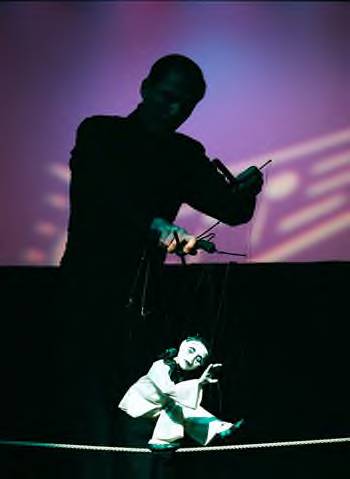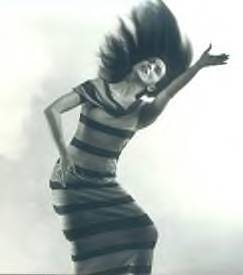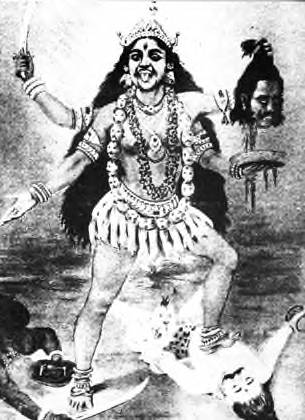|
|
 |
 |
|
Nobody's Puppet! by Monique Monet |
 |
 |
|
(Originally published in Jareeda Magazine) |
|
|
 |
 |
|
The ancient Sumerians taught that dance was the first existent form of artistic
self-expression. A million years before the dawn of history, there was dance. It was there - - before drawing or carving or singing; superseding even music. And now humanitiy's most ancient art is
passed down to us, in trust, to treasure and protect. In those days long gone, dance was the first art. And for many of us contemporary |
|
 |
 |
|
dancers it remains number one; the first and ultimate form of artistic self-expression. We are endowed with a prehistoric right
(and responsiblity) to stand up for our art, and for ourselves as dancers. |
 |
 |
|
The founder of Modern Dance, Martha Graham, once said, "It's important to remember that
the dancer is not required to try to interpret the music, but rather the music is a setting for the dance." I agree one hundred percent. In a performance situation,
with rare exception, it's the dancer who draws the crowds - - she's the star. And, to be quite honest about it, the musicians are "supporting actors." |
|
|
 |
 |
|
Therefore it's an abomination to see a truly fatigued, panting, sweating dancer struggling to keep up
with the endless rapid-fire percussion of a "grand-standing" doumbek player. It's a hopeless situation. (Obviously it takes much less effort to merely move your hands than it does to move your entire body.)
Maybe she can't stop him for acting like a musical bully, but she is obligated, in honor of the dance, not to allow herself to be made a puppet-like fool. Of course most drummers, most
musicians in general, are great to work with. Nothing can be more magical than dancing to a dynamic live band. But also few things can be more devastating to a performance than a musician who wants to take control of
the dance. As dance performers we should keep in mind this very basic fact: in any dance show, the dancer is primary - - and the musician is secondary. |
|
|
 |
 |
|
I'm happy and thankful to be able to say that, in my own experience, I've never had to deal
with over-bearing musicians. In various performances, Armando Mufufo, Joseph and Robaire, Michael Beach and "The Brothers", Seattle's MB Orchestra, (all of them among the best in the business) have
exercised their talent and consideration to help my dance to be the best that it could be. I have to admit, personally, I have experienced nothing but kindness, understanding,
|
|
 |
 |
|
and patience (as well as first rate talent) from the musicians I've worked with. |
 |
 |
|
But I've heard of, and even seen performance situations in which dancers were much less fortunate than I
have been. The following is one such story. I was there, and the experience continues to haunt me to this day: A couple of years ago I was invited to a club in the San Francisco Bay area to
watch a friend's performance. From the beginning she was very nervous about the well-known band, and particularly about the big name drummer, with whom she would be performing. And, as often
happens, the situation turned into one of self-fulfilling prophecy. She believed before she even stepped onto the dance floor that she was "in over her head." And for some reason that evening the musicians
seemed to sense and feed on her fears. Toward the end of a fifteen minute set, the doumbek player launched into a torrid drum solo. For nearly five minutes he seemed determined to use his
abundant skills to intentionally leave the dancer in his dust. And she danced as if her life depended on matching his every beat with a desperate hip thrust or frantic shimmy. All of us in
the audience were beginning to get the feeling that the dance floor was becoming a war zone. And it was more a massacre than a fair fight. The drummer would never stop. He was almost
literally pounding her into the ground. And then finally, dripping with perspiration, gasping for breath and crying at the same time, she abruptly surrendered and stumbled from the dance floor.
I tried to talked to her backstage but she was devastated beyond reasoning by her humiliation. (More than two years passed before she felt able to perform again.)
Just plain mean people are rare, but they do exist. And I've heard similar stories from other dancers. But in this particular case, how could she have advoided her dance performance tragedy?
A healthier mental attitude and a broader perspective of the situation would certainly have helped. It was only because she was a Middle Eastern Dancer that she was familiar with the band's
"lofty reputation." Outside the world of Middle Eastern Dance they were completely unknown. As far as the average audience member was concerned, she was the star. The audience was there to see the belly dancer
and, for most of them, the band was "sound track" for her dance show. My friend would certainly have had a much different attitude, and probably entirely different performance
experience if she'd viewed the show from the audience's perspective. |
|
|
 |
 |
|
In an example of on-stage "self-defense", the Egyptian dancer, Badia'a, describes
her handling of an out-of-control drummer: When she had ascertained beyond doubt that he was intentionally going out of his way to be uncooperative, she immediately took control of the situation. She stopped
her dance in mid-performance and slowly walked toward the drummer, making a show of clapping her hands to establish the proper beat she required. To the audience it appeared she was the boss, forced to take
time out to correct a truant, and in this case a very embarrassed, underling. |
|
 |
 |
|
Of course, few can match Badia'a's stage presence and |
 |
 |
|
confidence. But, when my San Francisco friend finally realized that the drummer was not playing for her, but was determined to
beat her into the ground, she at least could have (as a matador works a bull) simply stepped aside from her danee and with a greaceful flourish of her arm gestured toward the drummer as if announcing her percussion
solo. Even through that relatively passive action, she would have gained control; at least to the extent of stopping his abuse of her. He would no longer have her jumping frantically to his every beat; and would have
to promptly end his one man show or risk boring and alienating the audience. And even the most timid of dancers, if worst came to worst, and she found herself at the verge of tearful collapse, could use the last of
her energy to gracefully twirl off stage and disappear - - as if that was the way it had been planned all along. There is a saying regarding the handgun: It's better to have it and not need it, than to need it and
not have it.
I honestly can't thing of a workable paraphrase or metaphor to parallel that saying - - but the bottom line is, although the time may never come, be prepared (as a performer) to protect your art and your honor. The
odds are you will enjoy the same good fortune with musicians that I have. But just to be safe, it's important, at some deep subconscious level, to pre-program yourself: You will not passively, accept abuse. You are a
dancer. A practitioner of humankind's premiere art form. And no one has the right to kick you around. A the conclusion of Salome's dance performance, Harod was so impressed he offered her half of his entire
kingdom. (But there is no mention of his tipping the band even a "shekel".) |
 |
 |
|
All rights reserved |
|























